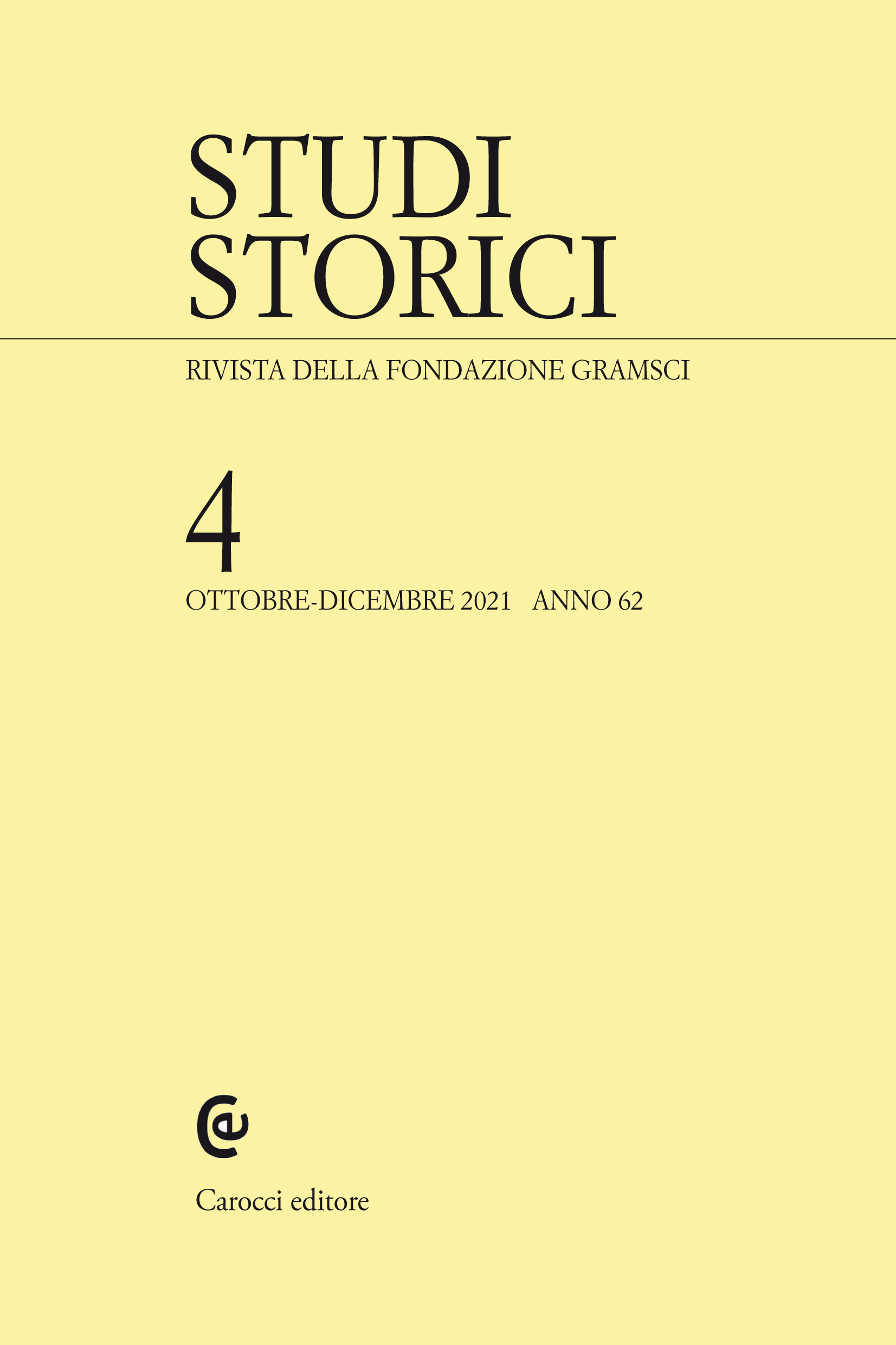
ottobre - dicembre 2021 anno 62
Sommario e abstract degli articoli
L’Organizzazione internazionale del lavoro tra le due guerre
s.g., b.s., pp. 829-833
Premessa
Foreword
The section is devoted to the history of the International Labour Organisation in the interwar years. The interaction between the interpretation outlined by Italian historian Franco De Felice in his seminal 1988 book Sapere e politica and the most recent historical scholarship, including the researches spurred by the ILO centenary in 2019, offers the starting point for papers addressing Albert Thomas and his successors’ diplomacy and networks, the development of social rights for workers and refugees, and the relationship between the ILO and Fascist Italy De Felice’s own intellectual project.
Keywords: International Labour Organisation, Interwar period, Social rights, Welfare.
Parole chiave: Diritti sociali, Organizzazione internazionale del lavoro, Periodo tra le due guerre, Welfare.
Gregorio Sorgonà, pp. 835-855
Sapere e politica. L’Organizzazione internazionale del lavoro nelle ricerche di Franco De Felice
Knowledge and Politics. The International Labour Organization in Franco De Felice’s Research
The essay outlines the development of Franco De Felice’s research on the history of the International Labour Organization (ILO) during the interwar period. By analyzing De Felice’s personal papers, the essay’s key to interpretation will underscore the connection between his political thought and the methodological proposal characterising his whole intellectual endeavour. In this regard, two paths unfold: the first contextualizes his biography in the crisis of Italian communism; the latter compares the research project undertaken in the 1980s with the present debate on the welfare state. At the same time, the essay suggests a comparison between De Felice’s pioneering work and the most recent scholarship on the ILO.
Keywords: International Labour Organization, Welfare State, History of Intellectuals, History of Historiography.
Parole chiave: Organizzazione internazionale del lavoro, Welfare, Storia degli intellettuali, Storia della storiografia.
Francesca Piana, pp. 857-887
Fra protezione sociale e lotta alla disoccupazione. Le negoziazioni e l’assistenza tecnica del Bureau international du travail a favore dei rifugiati russi (1919-1925)
Between Social Protection and the Fight against Unemployment. The Negotiations and Technical Assistance of the Bureau International du Travail in favour of Russian Refugees (1919-1925)
This article examines the work of the International Labour Organization (ILO) on behalf of Russian refugees in the early 1920s. It studies the ILO from within as well as in relation to national and international institutions. Before the ILO signed an agreement with the League of Nations for the placement of Russian and Armenian refugees in 1925, the question saw shifts and turns. At first the ILO took a mild interest in Russian refugees: it did not see them as “humanitarian objects,” but as persons who had rejected Bolshevism and lacked jobs and social protection. The ILO then provided technical assistance to the International Committee of the Red Cross and the League of Nations on questions including the census, statistics, resettlement plans, and passports, while failing to protect Russians, who in the meantime had been rendered stateless, from abuses. The question of Russian refugees not only allowed the ILO to experiment with the practical implications of its technical expertise, but it also turned out to be instrumental for using regulated migration as a tool to fight unemployment, thus aiming at establishing peace and social justice globally – at least on paper.
Keywords: Humanitarian aid, Refugees, Migrants, Protection, Technical assistance..
Parole chiave: Aiuto umanitario, Rifugiati, Migranti, Protezione, Assistenza tecnica.
Giulio Francisci, pp. 889-913
Cittadinanza, residenza e continuità contributiva: l’Organizzazione internazionale del lavoro e la protezione sociale dei lavoratori migranti nell’entre-deux-guerres (1919-1935)
Citizenship, Residence and Continuity of Contributions: the International Labour Organization and the Social Protection of Migrant Workers in the Interwar Period (1919-1935)
The social protection of migrant workers was one of the international labour standards that the International Labour Organisation promoted in the interwar period. Its aim was to overcome both technical and political obstacles that prevented migrant workers from fully enjoying social insurance. The 1925 Equality of Treatment (Accident Compensation) Convention and the 1935 Maintenance of Migrants’ Pension Rights Convention were the main results of the interwar multilateral talks on migration and social protection. The article traces this history, relying mainly on the archival records kept in the archives of the International Labour Office in Geneva.
Keywords: International Labour Organisation, Welfare, Migration, Citizenship, Social Insurance
Parole chiave: Organizzazione internazionale del lavoro, Stato sociale, Migrazione, Cittadinanza, Assicurazioni sociali.
Stefano Gallo, pp. 915-939
Fascismo, sindacato e democrazia secondo Albert Thomas (1919-1932)
Albert Thomas’s Views on Fascism, Trade Unions and Democracy (1919-1932)
Albert Thomas is one of the most important figures in understanding the overlap between European socialist culture and attempts to build an international political system after World War I. However, his benevolent public judgments on the Fascist government made a strong impression on public opinion at the time and remain a puzzle for historians today. The article attempts to provide elements of reflection for understanding the issue, primarily through an analysis of Thomas’s view of trade unions, modernization and democracy. For an Italy ravaged by the violence of fascism, corporatism and industrial productivity appear to be the fundamental axes for understanding Thomas’ political horizon.
Keywords: Fascism, Labour history, Trade unions, Modernisation. Corporatism.
Parole chiave: Fascismo, Storia del lavoro, Sindacati, Modernizzazione, Corporatismo.
Alessandro Brizzi, pp. 941-965
La «battaglia» delle 40 ore. Un aspetto delle relazioni tra l’Organizzazione internazionale del lavoro e l’Italia fascista negli anni Trenta
The Battle for 40 Hours. An Aspect of the Relations between the International Labour Organization and Fascist Italy in the 1930s
The quest for legitimacy was a major feature of the relationship between Fascist Italy and the ILO, the other one being the conflict between competing internationalisms. This article explores how this relationship was reshaped during the great crisis of the 1930s, by analysing the debates over the 40-hour workweek. As the ILO’s activity increasingly focused on this demand, which trade unions presented as means to fight unemployment, the Fascist regime responded by sponsoring an international convention. Then, as a form of work sharing was effectively introduced in Italy, its enactment was strongly intertwined with the promotion of Fascist corporatism within the ILO. It is thus argued that “labour diplomacy” is a key element for understanding Fascist social policy in the interwar years.
Keywords: Fascism, International Labour Organization, Corporatism, 40 hours, Great Depression.
Parole chiave: Fascismo, Organizzazione internazionale del lavoro, Corporativismo, 40 ore, Grande depressione.
Bruno Settis, pp. 967-994
Tra razionalizzazione e internazionalismo. Organizzazione internazionale del lavoro e Stati Uniti da Wilson a Roosevelt
Between Rationalization and Internationalism. The International Labour Organization and the United States from Wilson to Roosevelt
Starting from Franco De Felice’s interpretation of the interwar ILO, the essay explores the Organization’s relations with American intellectuals, trade unions, business associations, and government. Endeavours to build diplomatic relations and to bypass US withdrawal characterised the 1920s. Albert Thomas’s ILO established a deeply ambiguous relationship with scientific management and Fordism, which he and his followers viewed as methods to secure a compromise between capital and labour, guarantee the welfare of the working class and, eventually, organise society as a whole. Ambiguities and technocratic impulses grew even greater in the face of the Depression; through the connection with the New Deal, these were not completely resolved, but merged into a novel combination of foreign policy, social policy, recovery programme, and a critical review of rationalization itself.
Keywords: Internationalism, International Labour Organization, the New Deal, Rationalization, Taylorism.
Parole chiave: Internazionalismo, Organizzazione Internazionale del Lavoro, New Deal, Razionalizzazione, Taylorismo.
Ricerche
Barbara Gelli, pp. 995-1026
«Per bene che fusse persona plebea, era buon soldato». Popolo, plebe e virtú militari a Siena nella prima metà del Cinquecento
“Per bene che fusse persona plebea, era buon soldato.” Popolo, Plebs, and Military Virtues in Siena in the First Half of the 16th Century
Between the mid-15th and early 17th centuries, the profession of arms was a key element in qualifying the nobility of the ruling classes all over Italy and in legitimizing the formation of the city oligarchies. In the early 16th century, the popular ideology of the Republic of Siena was still open to individuals from the lower classes, but the ruling class controlled its operation through the selection of its most loyal clients. In the 1530s, the Sienese plebeians tried to set up a process of political self-justification, exploiting the ennobling value of the military art. This led to the foundation of the “Bardotti” Academy, an institution tasked with training new soldiers and “instructing” the plebeians in cultural values, with a view to ennobling them to make them equal to the citizens of Siena and promote their social ascent.
Keywords: Renaissance Siena, Military culture, Nobility, Plebs, Academies.
Parole chiave: Siena rinascimentale, Cultura militare, Nobiltà, Plebe, Accademie.
Note critiche
Federico Marazzi, pp. 1027-1049
Beni pubblici-beni del re. Le basi economiche dei poteri regi nell’Alto Medioevo
Public Goods – King’s Goods. The Economic Foundations of the Royal Powers in the Early Middle Ages
This article deals with the volume edited by F. Bougard and V. Loré, Biens publics, biens du roi. Les bases économiques des pouvoirs royaux dans le haut Moyen Âge / Beni pubblici, beni del re. Le basi economiche dei poteri regi nell’Alto Medioevo (2019).
Keywords: Public goods, King’s goods, Early Middle Ages.
Parole chiave: Beni pubblici, Beni del re, Alto medioevo.
Sfoglia gli altri numeri dell’anno 62 / 2021
Elenco dei fascicoli pubblicati dal 2010
Seleziona fascicolo...
- anno 65 / 2024
- 1
- anno 64 / 2023
- 1
- 2
- 3
- 4
- anno 63 / 2022
- 1
- 2
- 3
- 4
- anno 62 / 2021
- 1
- 2
- 3
- 4
- anno 61 / 2020
- 1
- 2
- 3
- 4
- anno 60 / 2019
- 1
- 2
- 3
- 4
- anno 59 / 2018
- 1
- 2
- 3
- 4
- anno 58 / 2017
- 1
- 2
- 3
- 4
- anno 57 / 2016
- 1
- 2
- 3
- 4
- anno 56 / 2015
- 1
- 2
- 3
- 4
- anno 55 / 2014
- 1
- 2
- 3
- 4
- anno 54 / 2013
- 1
- 2
- 3
- 4
- anno 53 / 2012
- 1
- 2
- 3
- 4
- anno 52 / 2011
- 1
- 2
- 3
- 4
- anno 51 / 2010
- 1
- 2
- 3
- 4
